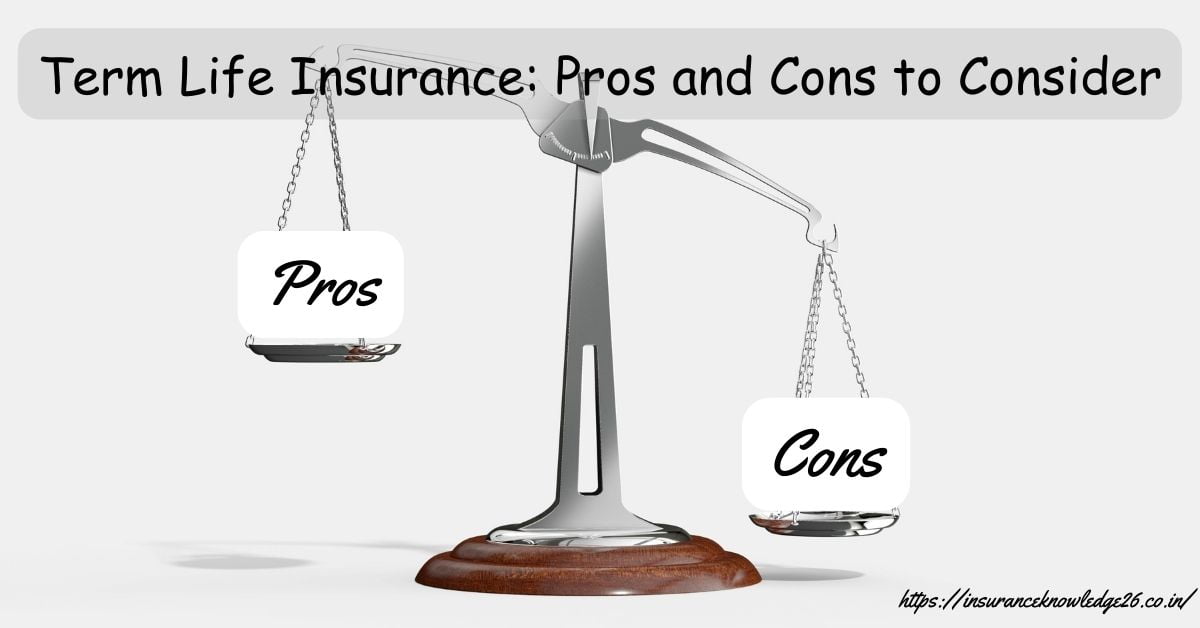Term Life Insurance: Pros and Cons to Consider
Life insurance is a critical financial tool that provides protection and security for individuals and their families. Among the various types of life insurance, term life insurance stands out as a popular choice due to its simplicity and affordability. It offers coverage for a specific period, typically ranging from 10 to 30 years, and pays out a death benefit to beneficiaries if the insured passes away during the policy term. While term life insurance offers many advantages, it also comes with its share of drawbacks. In this comprehensive guide, we will delve into the pros and cons of term life insurance to help you make an informed decision about whether it is the right choice for your needs.

Pros of Term Life Insurance
Affordability: One of the most significant advantages of term life insurance is its affordability. Compared to permanent life insurance policies like whole life or universal life insurance, term life insurance offers lower premiums. This affordability makes it an attractive option for individuals on a tight budget or those seeking cost-effective coverage for a specific period.
Simplicity: Term life insurance is straightforward and easy to understand. It provides straightforward coverage for a fixed term, and the premiums remain consistent throughout the policy period. This simplicity makes it easier for policyholders to manage their financial planning.
Flexibility: Term life insurance policies are flexible, allowing policyholders to customize their coverage according to their needs. You can select the policy term that aligns with your financial goals, whether it is to protect your mortgage, pay for your child’s education, or provide income replacement for your family.
Temporary Needs Coverage: Term life insurance is well-suited for covering temporary needs. For instance, if you have dependents relying on your income, but you expect to be financially independent after a certain period (e.g., after your children graduate or your mortgage is paid off), a term life policy can provide adequate coverage during that critical phase.
Mortgage Protection: For homeowners with outstanding mortgages, term life insurance can offer valuable protection. By choosing a term that aligns with your mortgage term, you can ensure that your family can continue to live in the home and avoid foreclosure in case of your untimely demise.
Income Replacement: If you are the primary breadwinner of your family, term life insurance can act as income replacement for your dependents in the event of your death. The death benefit can be used to cover daily living expenses, bills, and other financial obligations.
Peace of Mind: Knowing that your loved ones are financially protected in the event of your passing can bring peace of mind. Term life insurance offers reassurance that your family will be able to cope with financial challenges during a difficult time.

Cons of Term Life Insurance
No Cash Value Accumulation: Unlike permanent life insurance policies, term life insurance does not accumulate cash value over time. This means that if you outlive the policy term, you will not receive any return on the premiums paid.
Limited Coverage Period: The primary drawback of term life insurance is its temporary nature. Once the policy term expires, you are left without coverage unless you choose to renew the policy, which may come at a higher premium due to your increased age.
Renewal Premiums: If you decide to renew your term life insurance policy at the end of the initial term, the premiums may become significantly more expensive, especially as you age. This can make long-term coverage less cost-effective in the later years.
No Equity or Loan Options: Unlike permanent life insurance policies that allow you to borrow against the cash value, term life insurance does not offer any equity or loan options. This can be a disadvantage for those seeking to utilize life insurance as a financial asset during their lifetime.
Health Changes Impact Premiums: If your health deteriorates during the term of the policy, renewing the coverage or obtaining a new policy may be more expensive or even unattainable. Pre-existing medical conditions can significantly affect your eligibility and premiums.
No Investment Component: Term life insurance is purely a protection product and does not include an investment component. If you are seeking life insurance with a savings or investment feature, a permanent life insurance policy may be more suitable.
Limited Policy Customization: While term life insurance offers flexibility in terms of policy term, coverage amount, and beneficiaries, it lacks the ability to customize the policy to suit specific financial planning needs, such as estate planning or wealth transfer.
Term life insurance can be an excellent option for individuals and families seeking affordable and straightforward life insurance coverage for a specific period. Its affordability and flexibility make it an attractive choice for those with temporary financial needs, such as mortgage protection, income replacement, or educational expenses for dependents. However, it is essential to consider the limitations of term life insurance, such as the absence of cash value accumulation, limited coverage period, and potential premium increases upon renewal. For those seeking lifelong coverage and an investment component, permanent life insurance may be more suitable.
Ultimately, the decision to purchase term life insurance should be based on an individual’s specific financial goals, risk tolerance, and family needs. It is advisable to consult with a qualified insurance professional who can assess your circumstances and recommend the most suitable life insurance solution to meet your objectives and secure your family’s future.
Disclaimer
The information provided in this post is based on general knowledge and may not be up-to-date or applicable to specific insurance products or regulations in your jurisdiction. Insurance policies and regulations can vary widely, so it’s essential to research and verify information with local authorities or insurance providers.

